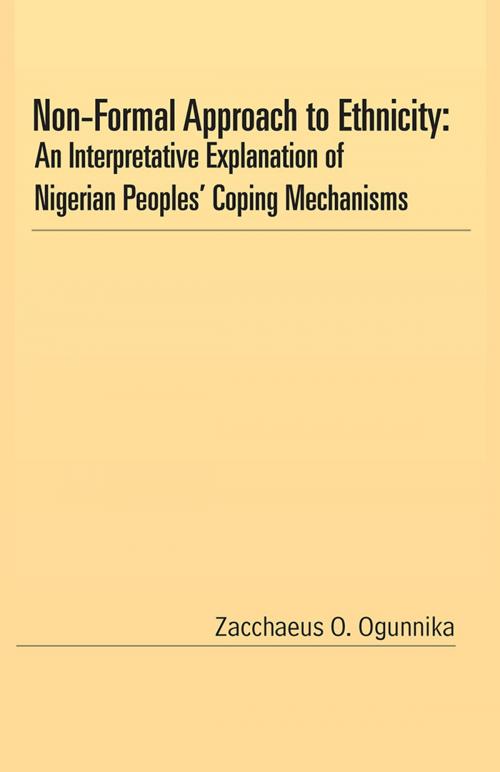Non-Formal Approach to Ethnicity
An Interpretative Explanation of Nigerian Peoples’ Coping Mechanisms
Nonfiction, Social & Cultural Studies, Social Science, Cultural Studies, African-American Studies| Author: | Zacchaeus O. Ogunnika | ISBN: | 9781466996731 |
| Publisher: | Trafford Publishing | Publication: | November 12, 2013 |
| Imprint: | Trafford Publishing | Language: | English |
| Author: | Zacchaeus O. Ogunnika |
| ISBN: | 9781466996731 |
| Publisher: | Trafford Publishing |
| Publication: | November 12, 2013 |
| Imprint: | Trafford Publishing |
| Language: | English |
This book, written by one of the foremost researchers in this field, represents one of the intellectual efforts on the explanation of the inter-ethnic phenomenon. The author went into the critique of the whole phenomenon and approached his frame of meaning from the actors side. That is why the book is subtitled The peoples non-formal mechanisms. The author is phenomenological in his approach and believes that the real meaning of any event should be based on the experience of the actors. He combined the pessimism of the ethnomethodologists with the realism of the phenomenologist. The result of this is an essay which is considered as being nearest to the true situation of inter-ethnic relations in Nigeria more than that of its predecessors. The book therefore reports the behaviors of Nigerians in actual situations. How different ethnicities pass and behave as if they are one. The book heavily relied on the W.I Thomas dictum which says that if man defines a situation as real, they are real in their consequences. The consequences of mutual deception and strategic interactions mentioned in the book become real as they produce the real tools and mechanisms for tension management in a multi ethnic society. The author dwells a lot on economic spheres where he identified for the first time in inter-ethnic relations literature, a phenomenon he refers to as market groups. This group unlike its counterpart, the economic associations, is informal, enduring and based on proper inter-ethnic understanding. The market group members declare their allegiance to the sarki of their commodity who may not necessarily be a member of their ethnic group. Different ethnic group members were united by the commodity they sold in the market. The commodity to dictate their interaction style rather than ethnic or primordial emotional attachments. One cannot do but remember Marxs idea on Fetishism of commodities in the section. Commodities assume and dominate the social psychology of the individuals and place ethnicity in the secondary position. The role of modern formal education in forging inter-ethnic unity in Nigeria as reported in the book is also very illuminating. The unity of curricula and subjecting the students to take the same West African Senior School Certificate Examination all over Nigeria regardless of the students state of origin or ethnic orientation contributes to the nipping of the inter-ethnic distrust in the bud. Another important thing one may think of is the problem of unity schools. To make this more effective more student exchanges should take place and the numbers of the unity schools should increase to give the young population an opportunity to practice the non-formal management mechanisms in their formative years.
This book, written by one of the foremost researchers in this field, represents one of the intellectual efforts on the explanation of the inter-ethnic phenomenon. The author went into the critique of the whole phenomenon and approached his frame of meaning from the actors side. That is why the book is subtitled The peoples non-formal mechanisms. The author is phenomenological in his approach and believes that the real meaning of any event should be based on the experience of the actors. He combined the pessimism of the ethnomethodologists with the realism of the phenomenologist. The result of this is an essay which is considered as being nearest to the true situation of inter-ethnic relations in Nigeria more than that of its predecessors. The book therefore reports the behaviors of Nigerians in actual situations. How different ethnicities pass and behave as if they are one. The book heavily relied on the W.I Thomas dictum which says that if man defines a situation as real, they are real in their consequences. The consequences of mutual deception and strategic interactions mentioned in the book become real as they produce the real tools and mechanisms for tension management in a multi ethnic society. The author dwells a lot on economic spheres where he identified for the first time in inter-ethnic relations literature, a phenomenon he refers to as market groups. This group unlike its counterpart, the economic associations, is informal, enduring and based on proper inter-ethnic understanding. The market group members declare their allegiance to the sarki of their commodity who may not necessarily be a member of their ethnic group. Different ethnic group members were united by the commodity they sold in the market. The commodity to dictate their interaction style rather than ethnic or primordial emotional attachments. One cannot do but remember Marxs idea on Fetishism of commodities in the section. Commodities assume and dominate the social psychology of the individuals and place ethnicity in the secondary position. The role of modern formal education in forging inter-ethnic unity in Nigeria as reported in the book is also very illuminating. The unity of curricula and subjecting the students to take the same West African Senior School Certificate Examination all over Nigeria regardless of the students state of origin or ethnic orientation contributes to the nipping of the inter-ethnic distrust in the bud. Another important thing one may think of is the problem of unity schools. To make this more effective more student exchanges should take place and the numbers of the unity schools should increase to give the young population an opportunity to practice the non-formal management mechanisms in their formative years.















